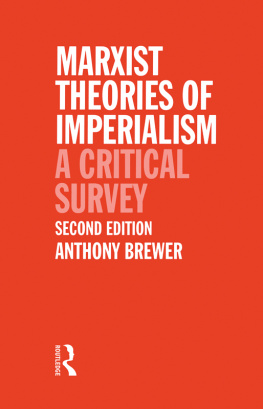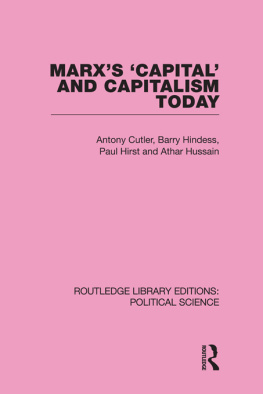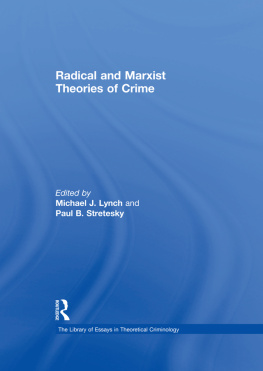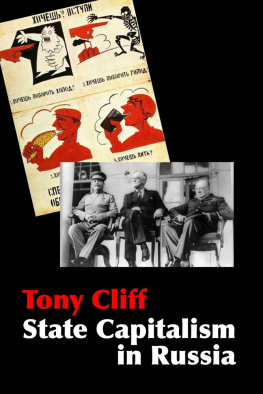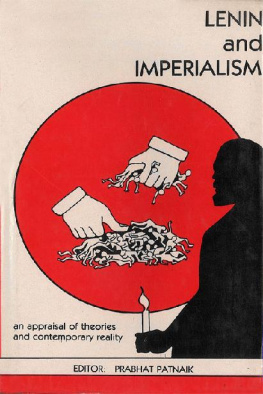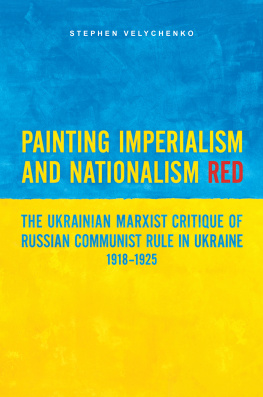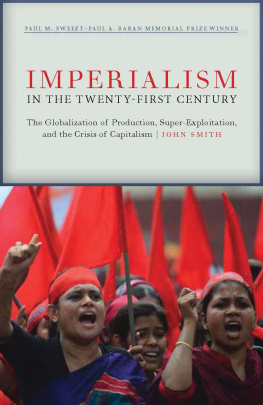Tony Brewer - Marxist Theories of Imperialism
Here you can read online Tony Brewer - Marxist Theories of Imperialism full text of the book (entire story) in english for free. Download pdf and epub, get meaning, cover and reviews about this ebook. publisher: Taylor and Francis, genre: Politics. Description of the work, (preface) as well as reviews are available. Best literature library LitArk.com created for fans of good reading and offers a wide selection of genres:
Romance novel
Science fiction
Adventure
Detective
Science
History
Home and family
Prose
Art
Politics
Computer
Non-fiction
Religion
Business
Children
Humor
Choose a favorite category and find really read worthwhile books. Enjoy immersion in the world of imagination, feel the emotions of the characters or learn something new for yourself, make an fascinating discovery.
- Book:Marxist Theories of Imperialism
- Author:
- Publisher:Taylor and Francis
- Genre:
- Rating:3 / 5
- Favourites:Add to favourites
- Your mark:
- 60
- 1
- 2
- 3
- 4
- 5
Marxist Theories of Imperialism: summary, description and annotation
We offer to read an annotation, description, summary or preface (depends on what the author of the book "Marxist Theories of Imperialism" wrote himself). If you haven't found the necessary information about the book — write in the comments, we will try to find it.
Marxist Theories of Imperialism — read online for free the complete book (whole text) full work
Below is the text of the book, divided by pages. System saving the place of the last page read, allows you to conveniently read the book "Marxist Theories of Imperialism" online for free, without having to search again every time where you left off. Put a bookmark, and you can go to the page where you finished reading at any time.
Font size:
Interval:
Bookmark:
Marxist Theories of Imperialism
A Critical Survey
This seminal account of Marxist theories of imperialism is now appearing in a revised and expanded edition.
Covering figures as diverse as Hobson, Luxembourg, Hilferding, Bukharin, Lenin, Frank, Wallerstein, Emmanuel and Warren, as well as Marx himself, it analyses how Marxists have accounted for the role of imperialism in the spread of world capitalism.
Marx had expected the spread of capitalism to lead to full capitalist development everywhere (unless anticipated by socialist revolution), while Lenin and his contemporaries concentrated on the role of monopoly and inter-imperialist rivalry. More recently, the focus of theory has shifted to the explanation of underdevelopment, which has prompted a renaissance of Marxist thought.
This book provides a clear guide to this important body of theory, establishing how the competing theories relate to each other and assessing them in terms of their logical coherence and their relevance to real problems.
Anthony Brewer is senior lecturer in Economics at the University of Bristol. He is the author of A Guide to Marxs Capital, 1984, and of a number of articles in learned journals.
Marxist Theories of Imperialism
A Critical Survey
Second Edition
Anthony Brewer

First published 1980 by Routledge & Kegan Paul
This edition published in the Taylor & Francis e-Library, 2001.
Second edition 1990
1980, 1990 Anthony Brewer
All rights reserved. No part of this book may be reprinted or reproduced or utilized in any form or by any electronic, mechanical, or other means, now known or hereafter invented, including photocopying and recording, or in any information storage or retrieval system, without permission in writing from the publishers.
British Library Cataloguing in Publication Data
Brewer, Anthony, 1942
Marxist theories of imperialism : a critical survey. 2nd ed.
1. Imperialism. Marxist theories, history
I. Title
325.3201
Library of Congress Cataloguing in Publication Data
A catalogue record for this book is available from the Library of Congress
ISBN 0415044693 (Print Edition)
ISBN 0-203-00381-0 Master e-book ISBN
ISBN 0-203-14742-1 (Glassbook Format)
In memory of Iris Brewer
Contents
Preface
My aim in this book is to survey Marxist writings on imperialism and, more broadly, on the emergence and development of the world capitalist economy. I have tried to maintain a sympathetic but critical position; critical because Marxist theories have often suffered from being accepted or rejected wholesale, rather than being subjected to detailed scrutiny and constructive criticism, and sympathetic because I think there is a lot to be learned from them.
In revising the book for the second edition, I found few major new ideas to incorporate; the last decade has been one of consolidation and reassessment. Dependency theories were still alive ten years ago, but the criticisms I and others made then have now been generally accepted, so I have gathered the story of the rise and fall of dependency theory into one (long) chapter. I have also added a chapter on Hobson which should, with hindsight, have been there all along.
I have benefited greatly from constructive criticism from others. Roger Berry, Martin Browning, Aidan Foster-Carter, and Andrew Friedman all gave me helpful advice when I was writing the first edition, but are not to blame for the results. Karen Snodin helped with translations. Gillian Baker, Pat Shaw, and Marjorie Lunt typed the first edition. The new edition, for those who are interested, was written and laid out in Microsoft Word, to produce a PostScript file, effectively using the typesetter to produce camera-ready copy as if it were a printer attached to my microcomputer. I owe a special debt of thanks to Emma Waghorn for firm but sympathetic editing, and to Alan Jarvis, David McCarthy, and others at Routledge who have guided me through the process. Finally, Janet Brewer has given invaluable support throughout.
is based on a paper presented at a conference on imperialism at Catania, Sicily, September 1987, to be published in the conference volume, Italia e Inghilterra nell Eta dell Imperialismo, edited by Professor E. Serra.
Abbreviations
Some books that are referred to repeatedly are cited in the text by an abbreviated form of their title. They are listed below; for full details see the bibliography.
Accumulation | Luxemburg (1951), The Accumulation of Capital |
Alliances | Rey (1973), Les alliances de classes |
Anti-Critique | Luxemburg (1972), The Accumulation of Capital an Anti-Critique |
AWS | Amin (1974), Accumulation on a World Scale |
Capital | Marx (1961, 1957, 1962), Capital, vols I-III |
Colonialisme | Rey (1971), Colonialisme, neo-colonialisme et transition au capitalism |
CULA | Frank (1969a), Capitalism and Underdevelopment in Latin America |
CWE | Wallerstein (1979), The Capitalist World Economy |
DAU | Frank (1978), Dependent Accumulation and Underdevelopment |
EPEA | Arrighi and Saul (1973), Essays on the Political Economy of Africa |
Hilferding (1970), Finance Capital | |
Imperialism | Lenin (1950), Imperialism, the Highest Stage of Capitalism |
IUD | Amin (1977), Imperialism and Unequal Development |
IWE | Bukharin (1972a), Imperialism and World Economy |
LAUR | Frank (1969b), Latin America: Underdevelopment or Revolution |
LL | Frank (1972), Lumpenbourgeoisie: Lumpendevelopment |
Manifesto | Marx and Engels (1950), Manifesto of the Communist Party |
MWS | Wallerstein (1974a), The Modern World System |
PEG | Baran (1973), The Political Economy of Growth |
UD | Amin (1976), Unequal Development |
UE | Emmanuel (1972), Unequal Exchange |
l
Introduction
The last two or three centuries have seen two interconnected developments that have transformed the world. First, production and productivity have increased to levels that would previously have seemed not so much impossible as inconceivable, and the whole nature of industry and of many of the goods produced has altered beyond recognition. How could earlier generations have conceived of live colour television pictures from the moon, broadcast to a mass audience in their own homes, or flocks of aircraft carrying northern Europeans on their annual migration to the resorts of the Mediterranean? Second, inequalities of wealth and power between different parts of the world have grown to an equally unprecedented degree. Americans and Europeans sit in comfortable homes, watching televised reports of famine in Africa. These are facts that everyone knows, but we tend to take them for granted and to ignore the extent to which they determine the whole character of the modern world. They can only be understood and analysed by looking at the historical process by which they have evolved, on a world scale, over a period of centuries.
Next pageFont size:
Interval:
Bookmark:
Similar books «Marxist Theories of Imperialism»
Look at similar books to Marxist Theories of Imperialism. We have selected literature similar in name and meaning in the hope of providing readers with more options to find new, interesting, not yet read works.
Discussion, reviews of the book Marxist Theories of Imperialism and just readers' own opinions. Leave your comments, write what you think about the work, its meaning or the main characters. Specify what exactly you liked and what you didn't like, and why you think so.

